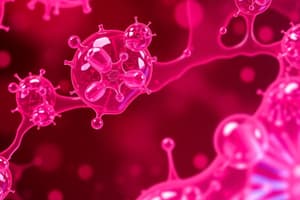Podcast
Questions and Answers
What is the fundamental unit of life?
What is the fundamental unit of life?
cell
Who published the statement 'Omnis cellula e cellula'?
Who published the statement 'Omnis cellula e cellula'?
Rudolf Virchow
Which of the following is NOT a component of the cell theory?
Which of the following is NOT a component of the cell theory?
- Cell is the smallest unit of life of all organisms.
- Cells can arise from non-cellular materials. (correct)
- All cells arise only by division of pre-existing cells.
- All organisms consist of 1 or more cells.
What defines eukaryotic cells?
What defines eukaryotic cells?
The largest cell measures ________ (specify dimensions and type).
The largest cell measures ________ (specify dimensions and type).
Match the following cell types with their characteristics:
Match the following cell types with their characteristics:
What are the three major components of eukaryotic cells?
What are the three major components of eukaryotic cells?
What is chromatin composed of?
What is chromatin composed of?
Flashcards are hidden until you start studying
Study Notes
Cell Definition and Historical Context
- Cells are protoplasm masses enclosed within a cell membrane, containing a nucleus, and are recognized as the fundamental unit of life.
- Rudolf Virchow proposed "Omnis cellula e cellula" in 1855, asserting that all cells originate from pre-existing cells.
Proponents of the Cell Theory
- Matthias Jacob Schleiden: Claim that all organisms consist of one or more cells; identified that the smallest known cell measures 0.0001 micrometers in bacteria and the largest cell is an ostrich egg, measuring 170mm x 130mm.
- Theodore Schwann: Emphasized the cell as the basic unit of life, establishing three key concepts that contributed to the cell theory. Concluded that both plants and animals are made of cells and that cells have independent lives governed by the organism's overall life.
- Robert Hooke: Coined the term "cell" from the Latin "cellula," meaning small room, and is recognized as the English Father of the Microscope.
Basic Types of Cells
- Eukaryotes:
- Cells contain a defined nucleus enclosed by a nuclear membrane.
- Eukaryotic cells are the primary components of multicellular organisms, such as animal cells.
- Prokaryotes:
- Cells lack a nuclear membrane and do not have a distinct nucleus.
- Mainly consist of bacteria and blue-green algae.
Major Components of Eukaryotic Cells
- Cell Membrane: Encloses the cell, separating it from its external environment.
- Nucleus:
- Controls cellular activity by regulating RNA synthesis, which in turn controls protein synthesis.
- Composed of chromatin, which consists of coiled strands of DNA associated with histones (basic proteins).
- Cytoplasm: The fluid within the cell where various cellular processes occur.
Studying That Suits You
Use AI to generate personalized quizzes and flashcards to suit your learning preferences.




